Hello and welcome to Mind the Gap, a newsletter that adds perspective to the gender developments of the week.
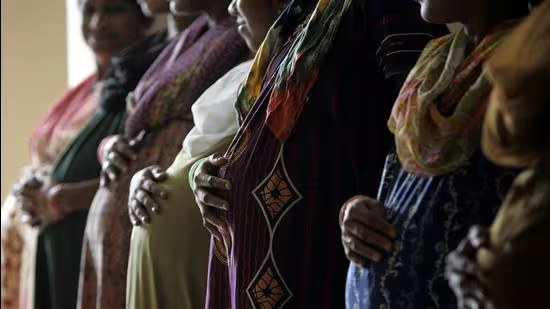
Behind the various laws that seek to regulate women’s bodies lies the question of choice. How freely do women exercise agency when it comes to marriage, when to have a baby, or how many babies to have? (Hindustan Times)
THE BIG STORY: Of women’s bodies
On December 1, Lok Sabha passed the Assisted Reproductive Technology (Regulation) Bill by a voice vote after a three-hour discussion. The bill is the most recent of a series of legislations that concern women’s bodies including one on surrogacy (passed in 2019) and abortion (passed earlier this year).
The gender composition of the Lok Sabha is 86% men and 14% women.
The ART bill stipulates that all assisted reproductive technology clinics and banks must register with a national registry. Women who wish to donate ovum must be married, between 25 and 35-years-old and have at least one child of their own, aged three years and above.
Exclusionary
The bill places restrictions on single women as donors and excludes men, transgender people and LGBTQ couples from those who can avail of ART. “Why are you depriving them,” asked Congress MP, Karti Chidambaram who opened the debate. He added that the restriction of donors to married women is patriarchal and reeks of a “colonial” mindset.
Other MPs too raised the issue of exclusion. NCP’s Supriya Sule said adoption rules framed in 2017 excluded single men from adopting girls. “Why don’t we take the help of women and child development ministry and speak to experts to see how these adoption rules can be changed?” she asked.
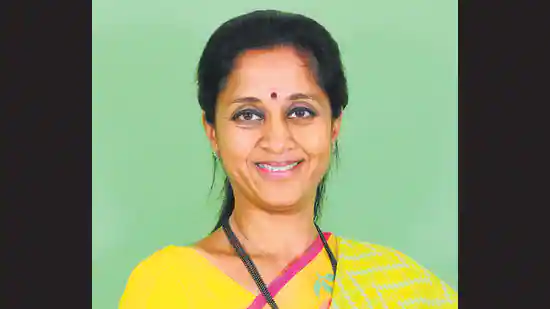
NCP’s Supriya Sule said adoption rules framed in 2017 excluded single men from adopting girls
“The major exclusion here is exclusion of single parents, transgenders and LGBT couples,” added TMC’s Kakoli Ghosh Dastidar. “They also have a right to become parents.”
Ethical questions
India has emerged as a hub for the global fertility market, valued at over $400 million, according to a 2012 UN study and predicted to rise to $6 billion a year within the decade. A bill to regulate and standardise this sector to ethical benchmarks is certainly called for.
But the exclusion of a group of citizens goes against the grain of a slew of Supreme Court judgments that have upheld the rights of transgender people (NALSA, 2014), decriminalised homosexuality (2018, Navtej Johar) and upheld right to privacy (2017, Puttaswamy that held that “choice of a family life and the dignity of being” applied to all individuals).
The ART bill has been under discussion since 2008 when the Indian Council for Medical Research (ICMR) drew its first draft.
But ethical questions remain. For instance, the surrogacy bill bans commercial surrogacy and while the concept of renting a womb for surrogacy is unpalatable, questions remain about ‘altruistic’ surrogacy. How do you ensure this altruism? Even if you limit this to immediate family, can the state ensure that it’s not just relatives on the margin (the widowed, the poor) on whom families put pressure?
Behind the various laws that seek to regulate women’s bodies lies the question of choice. How freely do women exercise agency when it comes to marriage, when to have a baby, or how many babies to have?
Coincidentally, the ART bill comes at a time when hard-won rights of women to have control over their bodies is currently under threat in the United States. In October, the state of Texas rolled out a near-total ban on abortion. And on December 1, the day India passed the ART bill, the United States Supreme Court began hearing arguments on whether a 2018 Mississippi state law that bans most abortions after 15 weeks is unconstitutional.
Read more about the ART bill here.
BACKGROUNDER: The rape trial of disgraced priest Robin Vadakkumchery
The rape trial of defrocked priest Robin Vadakkumchery took another turn when on December 1 the Kerala High Court reduced his 20 year prison term to 10 years. The court also reduced the fine from ₹300,000 to ₹100,000 imposed on him for raping and impregnating a 16-year-old schoolgirl in 2016.
The reduction of the jail term and fine by Justice Narayana Pisharadi follows an appeal filed by the 53-year-old Vadakkumchery. His earlier conviction by a POCSO (Protection of Children from Sexual Offences) court was under cases concerning public servants that prescribe a maximum sentence of 20 years. The former priest had appealed to be tried under a clause that prescribes a lesser punishment.
In July, the rape survivor as well as Vadakkumchery had approached the Supreme Court for permission to marry. The apex court denied permission.

Robin Vadakkumchery was permanently expelled from priesthood in March 2020, two years after Pope Francis called for “zero tolerance” for clergymen who sexually exploit children (ANI)
Vadakkumchery was serving as a parish vicar at a church-backed school where the girl was studying in class 11. The crime came to light when the girl became pregnant after he raped her. She subsequently gave birth in February 2017. Vadakkumchery was arrested later that month from near Kochi international airport while he was reportedly trying to slip out of the country. During the trial, the girl and her mother turned hostile, and at one point even accused her own father of raping and impregnating her. The verdict was handed out on the basis of evidence, including a DNA test.
Robin Vadakkumchery was permanently expelled from priesthood in March 2020, two years after Pope Francis called for “zero tolerance” for clergymen who sexually exploit children.
NEWSMAKER
Sociologist and feminist legal scholar, Pratiksha Baxi has been awarded the Infosys Prize 2021 laureate in social sciences for her work on sexual violence and jurisprudence. Her 2014 book, Public Secrets of the Law: Rape Trials in India revealed how gendered violence is reproduced in juridical practice.
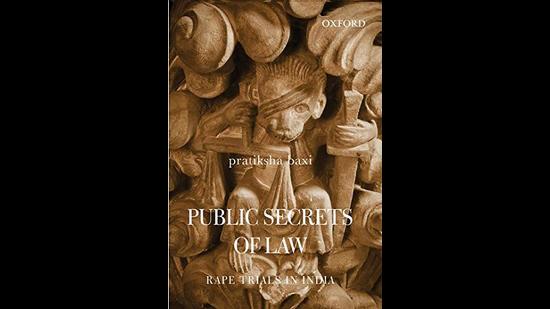
Public Secrets of the Law: Rape Trials in India
GENDER TRACKER
Is a husband justified in hitting or beating his wife?
83.8 of women in Telangana, the most in any Indian state, said yes.
The least was Himachal Pradesh where 14.8% of women responded yes.
Source: National Family Health Survey-5.
WATCH
SorryThankyouTataByeBye: Marriage, choice, agency in this fun video directed by Paromita Vohra of Agents of Ishq and Oxfam India. Watch here.
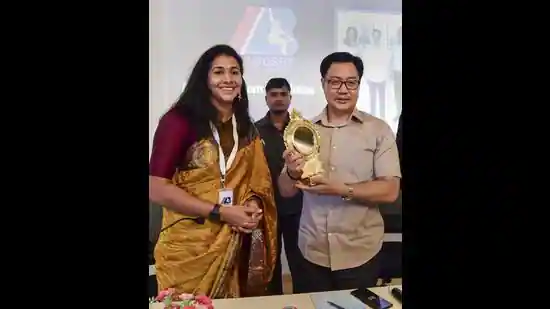
Former Union Sports Minister Kiren Rijiju and Athlete Anju Bobby George (PTI)
IT’S RAINING BOOKS: Data, memoirs and insinuations
Among India’s finest data journalists, Rukmini S’s book, Whole Numbers and Half Truths uses data to unveil what political scientist Pratap Bhanu Mehta calls a “fascinating portrait of India in its various textures.” Published by Westland, ₹699, the book is out on December 6.
News of the publication of Ranjan Gogoi’s memoirs, Justice for the Judge was received by a great deal of comment—much of it negative. Mahua Moitra, MP from the TMC asked in a tweet if the book would be sold in a “sealed envelope”, a reference to sexual harassment charges made by a junior court assistant against Gogoi, then the chief justice of India. The charges led to an inhouse enquiry and speedy exoneration by his peers. Gogoi is now a member of Parliament’s upper house.
Co-written with mystery writer Louise Penny, Hillary Clinton’s political thriller, State of Terror has a character, President Eric Dunn who a reviewer describes as a “hulking moron whose breath smells of meat.” A reference to former president Donald Trump whose love of hamburgers is well-known? “Could have been based on anyone…” tweeted Clinton.
MARK YOUR CALENDAR: Petitions on same-sex marriage
A two-judge bench of the Delhi High Court has issued notice in an application that seeks the livestreaming of proceedings in the cases before it for the recognition of same-sex marriage since they raise an issue of “great national importance”. Another petition has asked for same-sex marriages to be registered under a secular law like the Special Marriage Act. The petition says the Hindu Marriage Act is based on dharmic texts and define marriage as between a biological man and a biological woman.
The Delhi High Court is scheduled to hear the petitions on February 3, 2022.
STORIES YOU MIGHT HAVE MISSED
Free soul: The Madhya Pradesh home department has granted permission to a constable, identified as female since birth, to undergo sex reassignment surgery without affecting their service. This is the first such permission granted by the state government. The constable has called it “life changing”, reports Shruti Tomar. “Now, I will be a free soul, and will live my life to the fullest.”
Dombivli horror: Maharashtra police have filed a charge sheet against 33 people, including four minors, who were booked in September for sexually assaulting a 15-year-old girl in Dombivli from January to September this year. The charge sheet, reports Gautam S. Mengle, includes statements by 122 witnesses as well as reports of technical and forensic investigation. The horrific gang-rape case came to light when a video showing the sexual assault was posted on a WhatsApp group.
Woman of the year: The only Indian to win a world championship medal who now works to develop young athletes, sprinter Anju Bobby George was awarded ‘Woman of the Year” by World Athletics. Avishek Roy explains why here.
FIELD NOTES:
Crime and women’s work: Various theories have been forwarded to explain why India’s women are dropping out of the labour force despite gains in education. Lack of infrastructure, such as safe public transport and reliable and affordable childcare, a disproportionate burden of housework on women that leaves them with very little time for paid work outside, and patriarchal expectations of what work is suitable for women are among the various reasons that have been suggested.
Now, a new study by Initiative for What Works to Advance Women and Girls in the Economy (IWWAGE) has a new theory: crimes against women and girls as a barrier to their equal participation in and contribution to society. The study by lead author Neelanjana Gupta correlates state-wise data on crimes against women with female labour force participation (FLFP) to find how lack of safety and increasing crime acts as a barrier to women from stepping out to work. For instance, states like Himachal Pradesh, Meghalaya and Sikkim that have consistently maintained high FLFP also have low rates of crime against women. In Assam and Delhi, where crime rate is high, women’s workforce participation is low.
Read the study here.
AROUND THE WORLD
Apology for 16 years in jail: American author Alice Sebold (The Lovely Bones) has apologised for her part in the wrongful conviction of Anthony Broadwater who has been cleared of raping her in 1981. The account of that rape resulted in a book, Lucky, that sold more than a million copies and launched Sebold’s career as a writer. The man she wrongfully accused of raping her served a 16-year prison term and, after his release, was placed on a sex offender’s list.
The wrongful conviction came to light after an executive producer working on a film adaptation of Lucky found discrepancies and hired a private investigator to look into the wrongful conviction.
#WhereIsPengShuai: The Women’s Tennis Association (WTA) announced the suspension of all tournaments in China amid concern for Chinese player Peng Shuai who made sexual harassment charges against former Chinese vice-premier Zhang Gaoli. Read why sports journalist Sharda Ugra called WTA’s decision ‘path-breaking’ here.
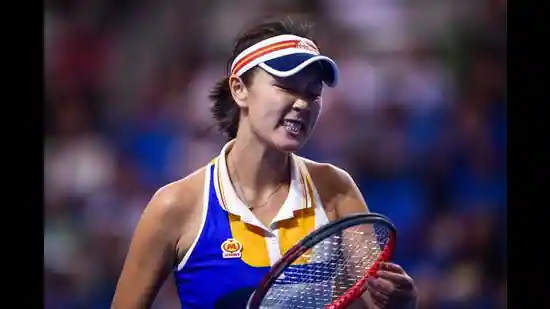
The Women’s Tennis Association (WTA) announced the suspension of all tournaments in China amid concern for Chinese player Peng Shuai (AFP)
Canada Bans Conversion Therapy: The House of Commons voted to ban the controversial therapy said to “cure” homosexuality. The widely discredited quack treatment has no basis in medicine or science.
That’s it for this week. If you have a tip or information on gender-related developments that you would like to share write to me at: namita.bhandare@gmail.com.
Namita Bhandare writes and reports on gender
The views expressed are personal
Marika Gabriel contributed to the making of this page.